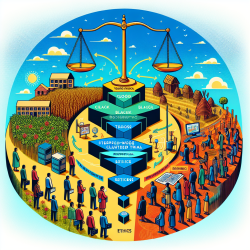Introduction
Violence against women (VAW) is a pervasive issue that transcends cultural and geographical boundaries. The research article "Violence Against Women" by Emma Fulu and Stephanie Miedema provides a comprehensive analysis of how globalization influences intimate partner violence (IPV) through the lens of the integrated ecological model. This model, originally developed by Lori Heise, is expanded in this research to include global factors, offering practitioners a robust framework to understand and address VAW.
Understanding the Integrated Ecological Model
The integrated ecological model posits that IPV is influenced by factors at multiple levels: individual, relationship, community, and macro-social. The research by Fulu and Miedema suggests adding a global dimension to this model, acknowledging the profound impact of globalization on VAW. By incorporating global ideologies, economic integration, religious fundamentalism, and cultural exchanges, practitioners can better understand the complex dynamics that contribute to IPV.
Key Insights from the Research
- Global Ideologies: The research highlights how global women's rights movements have influenced national legislation and societal attitudes towards VAW. Practitioners can leverage this understanding to advocate for policy changes and raise awareness about women's rights.
- Economic Integration: Economic factors, such as migration and urbanization, can exacerbate or mitigate IPV. Understanding these dynamics can help practitioners develop targeted interventions that address economic vulnerabilities.
- Religious Fundamentalism: The rise of religious fundamentalism can influence gender roles and power dynamics, often to the detriment of women's rights. Practitioners should be aware of these influences and work to promote gender equality within these contexts.
- Cultural Influences: Global cultural exchanges can reshape notions of masculinity and femininity, impacting IPV rates. Practitioners can use this knowledge to challenge harmful gender norms and promote healthy relationships.
Implementing the Research in Practice
Practitioners can utilize the expanded ecological model to design more effective interventions. By considering the global context, they can tailor their approaches to the specific cultural and economic realities of the communities they serve. This might include:
- Developing culturally sensitive educational programs that address both local and global influences on gender norms.
- Collaborating with policymakers to create legislation that reflects the complexities of globalization and its impact on VAW.
- Engaging with community leaders to foster environments that support women's rights and challenge harmful traditional practices.
Encouraging Further Research
While the expanded ecological model provides a comprehensive framework, there is still much to learn about the intersections of globalization and VAW. Practitioners are encouraged to contribute to this growing body of research by exploring how global trends manifest in their local contexts. By doing so, they can help refine the model and improve outcomes for women worldwide.
To read the original research paper, please follow this link: Violence Against Women.










